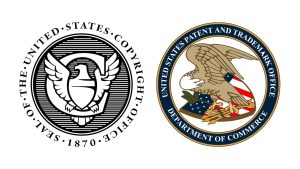The U.S. Copyright Office and USPTO Announce a Joint Study on NFT-Related IP Issues
 Yesterday, the U.S. Copyright Office (USCO) and U.S. Patent and Trademark Office (USPTO) announced a joint study on IP issues related to NFTs. This follows a Congressional request by senators Leahy and Tillis that the Offices explore these issues. Today, the Offices will publish a Notice of Inquiry (unpublished version can be found here), with a notice-and-comment period to follow, seeking stakeholder/private industry feedback on the following topics:
Yesterday, the U.S. Copyright Office (USCO) and U.S. Patent and Trademark Office (USPTO) announced a joint study on IP issues related to NFTs. This follows a Congressional request by senators Leahy and Tillis that the Offices explore these issues. Today, the Offices will publish a Notice of Inquiry (unpublished version can be found here), with a notice-and-comment period to follow, seeking stakeholder/private industry feedback on the following topics:
News of Note for the Internet-Minded (11/8/22) – AI Continues to Demonstrate Its Double-Edged Potential
In today’s News of Note, anxieties continue to grow over AI-generated art, effective cybersecurity for the high-tech era, and the impact of facial recognition and gunshot detection technology on human rights.
“Primary Function” Test Propels Yet Another Service Provider to Victory in New York Sales Tax Case
An administrative law judge in the New York State Division of Tax Appeals rejected the state’s position that a taxpayer providing a web-based service which allowed clients to identify effective and ineffective messaging through information, analysis and reports was selling taxable software. Following the rationale applied in a series of recent sales tax cases, including Matter of 1Life Healthcare, Inc., DTA No. 829434 and Matter of Breakdown Services, Ltd., DTA No. 829396, the judge concluded in her September 29, 2022, determination that the taxpayer’s service was nontaxable because its primary function was an information service that was personal or individual in nature.
News of Note for the Internet-Minded (9/19/22) – Quantum Computing, a Meaningful Merge and AI All Over
In today’s News of Note, AI’s increased presence in traditional human roles stirs debate over the future of artists and actors, CISA advises organizations to develop cybersecurity plans for quantum computers, Atari moves into The Sandbox metaverse, and more.
The Merge: Ethereum’s Long-Awaited Overhaul May Be Imminent
 Ethereum, the second largest blockchain-based platform by market cap, is tentatively scheduled to convert its consensus mechanism from proof-of-work (PoW), which incentivizes miners to solve mathematical puzzles to update the blockchain, to proof-of-stake (PoS), which makes decisions about updates through a vote among holders that have “staked” cryptocurrency that is “at risk” due to bad behavior, on September 15. This software update (the “Merge”) will be a complete overhaul of the system that has been running for the past seven years. For nearly two years, a separate PoS blockchain, called the Beacon chain, has been operating parallel to the original Ethereum blockchain to allow software developers to test and enhance it. The Merge will join both together. PoS will require 99.9% less energy to maintain than PoW and, if successful, the Merge will permit more significant improvements to Ethereum in the future. This would be welcome news for the crypto industry, which has had a very difficult year so far.
Ethereum, the second largest blockchain-based platform by market cap, is tentatively scheduled to convert its consensus mechanism from proof-of-work (PoW), which incentivizes miners to solve mathematical puzzles to update the blockchain, to proof-of-stake (PoS), which makes decisions about updates through a vote among holders that have “staked” cryptocurrency that is “at risk” due to bad behavior, on September 15. This software update (the “Merge”) will be a complete overhaul of the system that has been running for the past seven years. For nearly two years, a separate PoS blockchain, called the Beacon chain, has been operating parallel to the original Ethereum blockchain to allow software developers to test and enhance it. The Merge will join both together. PoS will require 99.9% less energy to maintain than PoW and, if successful, the Merge will permit more significant improvements to Ethereum in the future. This would be welcome news for the crypto industry, which has had a very difficult year so far.
Ability of AI to Invent Struck a Resounding and Uncompromising Blow
 Though we recently touched on the U.S. Court of Appeals for the Federal Circuit ruling that only natural beings, which do not include artificial intelligence, can be an inventor under the U.S. Patents Act, the decision merits additional discussion.
Though we recently touched on the U.S. Court of Appeals for the Federal Circuit ruling that only natural beings, which do not include artificial intelligence, can be an inventor under the U.S. Patents Act, the decision merits additional discussion.
Defining artificial intelligence (AI) can be a challenging task due to the expansiveness of its reach and evolving nature if its application. At its core, AI is the use of computer systems to perform tasks which historically have required human intelligence. Thus, AI can interpret and learn from data, creating alone, using what it has learned from this data, without additional human input. Such machine learning is further refined into deep learning, in which artificial neural networks—algorithms which copy how the human brain works—learn in a manner that mimics how humans do but by processing vast amounts of data. This neural networks approach of having computers “learn” as the human brain does differs from the more traditional rules-based computer programming, in which a computer is programmed with the explicit rules it will follow. Even as AI-powered computers begin to mimic human thinking, going beyond following predetermined tasks and routines, it’s not surprising that while AI is good at rules-based thinking, it cannot mimic certain functions of the human brain yet.
News of Note for the Internet-Minded (8/10/22) – DeepMind, DALL-E and Fractured Fingers
AI technology dominates the news cycle with news of DeepMind’s groundbreaking discovery of almost all structures of known proteins, an ethical dilemma prompted by a chess-playing robot that broke its young opponent’s finger, the artistic possibilities that DALL-E’s text-to-picture art tool may deliver, and more.
No Brain, No Gain: U.S. Patent Inventors Must Be Human
The U.S. Court of Appeals for the Federal Circuit has agreed with the U.S. Patent Trademark Office (PTO) in holding that artificial intelligence (AI) cannot be considered an “inventor” for purposes of obtaining patents.
The Black Box Conundrum: Go Weak or Stay Strong?
 Even as artificial intelligence (AI) has become more commonplace and relied upon by businesses in different industries, it still faces criticism on whether it can be implemented in a safe and ethical manner and, related, how the bias often inherent in the underlying algorithms can be detected and reduced.
Even as artificial intelligence (AI) has become more commonplace and relied upon by businesses in different industries, it still faces criticism on whether it can be implemented in a safe and ethical manner and, related, how the bias often inherent in the underlying algorithms can be detected and reduced.






